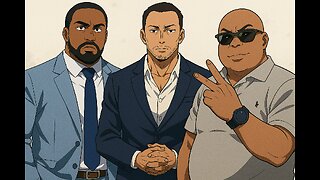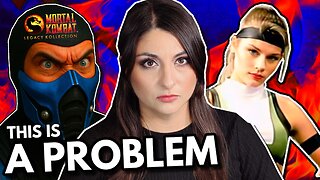Premium Only Content

The "State of Judea" Ilan Pappé Argues is Dominated by Jewish Extremists
Ilan Pappé: The Decline of the Zionist Project
The "State of Judea" Ilan Pappé Argues is Dominated by Jewish Extremists
Google AI Overview
The user is asking about the connection between Haredi Jews and historian Ilan Pappé's analysis of the decline of the Zionist project.
Ilan Pappé, an Israeli historian, argues that the Zionist project is in its "last phase" or "collapsing". A key aspect of his recent analysis is the growing internal division within Israeli society, including the tension surrounding the Haredi (ultra-Orthodox) population, which he sees as contributing to Zionism's decline.
Ilan Pappé's Analysis of the Haredi Factor
In his analysis of the "collapse of Zionism," Pappé specifically points to:
Internal divisions: He notes that one of the indicators of Zionism's decline is the growing chasm within Israeli Jewish society.
Military draft exemptions: Pappé mentions the widespread perception of the Israeli army's inability to defend itself and the major pressure to end the long-standing military exemption for Haredi Jews. This conflict over the draft is a significant point of internal friction, deepening political divisions within Israel.
The "State of Judea": Pappé argues that the current political landscape is dominated by Jewish extremists who have turned Israel into what he calls the "state of Judea" - a state that fuses religious Zionism with Orthodox Judaism. This extremist government, in his view, is willing to abandon liberal democratic values and prioritizes the expansion of settlements and the removal of Palestinians, which he sees as an aggressive, final phase of the Zionist project.
Haredi Views on Zionism
It was just ruled that now they are demanded to join the IDF and be violent. The Haredi community itself is not monolithic in its views on Zionism, but their historical and theological positions are distinct from the secular Zionist movement that founded the state.
Historical Opposition: Many Haredi leaders were historically opposed to Zionism, viewing it as a secular nationalist movement that sought to redefine Judaism as a nationality rather than a religion. Some believed that the creation of a Jewish state prior to the Messianic era was a violation of religious law (the "Three Oaths").
Current Positions: Today, some Haredi groups cooperate with the Israeli political system to secure funding and military exemptions, while maintaining a non-Zionist or even anti-Zionist stance. A minority of Haredim (such as Neturei Karta) actively oppose the existence of the State of Israel altogether.
Religious Zionists ("Hardal"): There is also a group known as "Hardal" who combine Haredi religious observance with the ideology of Religious Zionism, which is a different movement entirely and generally supportive of the state and the settlement enterprise.
In essence, while Haredi Jews did not create the anti-Zionist analysis offered by Pappé (who comes from a secular, academic background), their community's historical distance from the core Zionist ideology and current internal conflicts with the secular state are, in Pappé's view, contributing factors to the ultimate unsustainability and potential collapse of the Zionist project.
Israeli historian Ilan Pappe: 'This is the last phase of Zionism'
Al Jazeera
aljazeera.com
Jan 14, 2025 — Pappe: They didn't get the same education as young Jews in America. They got an education from a very indoctrinated country. And that's the key.
In 1977, the award-winning journalist and film-maker, John Pilger, made a documentary called Palestine Is Still The Issue (1977). He told how almost a million Palestinians had been forced off their land in 1948, and again in 1967. In this in-depth documentary, he has returned to the West Bank of the Jordan and Gaza, and to Israel, to ask why the Palestinians, whose right of return was affirmed by the United Nations more than half a century ago, are still caught in a terrible limbo -- refugees in their own land, controlled by Israel in the longest military occupation in modern times.
'The fate and struggle of the Palestinians,' says Pilger, 'are not just critical to the overdue recognition of their basic human rights, but are also central to whether the region, and the wider world, are plunged into war. Israel is now one of the biggest military powers in the world. While nothing changes, the dangers become greater. This is a film about a nation of people, traumatized, humiliated and yet resilient. In trying to liberate less than a quarter of historic Palestine, they have had no army, no air force, and no powerful friends -- and have fought back with slingshots and now with the terrorism of the suicide bombers.'
In a series of extraordinary interviews with both Palestinians and Israelis, John Pilger weaves together the issue of Palestine. He speaks to the families of suicide bombers and their victims; he sees the humiliation of Palestinians imposed on them at myriad checkpoints and with a permit system not dissimilar to apartheid South Africa's infamous pass laws. He goes into the refugee camps and meets children who, he says, 'no longer dream like other children, or if they do, it is about death.'
Continually asking for the solution, John Pilger says it is time to bring justice, as well as peace, to Palestine.
Google AI Overview
Palestine Is Still the Issue (TV Movie 2002) - IMDb
Palestine Is Still the Issue is a 2002 documentary by John Pilger and Tony Stark that investigates the Israeli occupation of the West Bank and Gaza to understand why peace remains elusive. The film, inspired by Amira Hass's book Drinking the Sea at Gaza, features interviews with Palestinians and some dissenting Israelis, showing the impact of the occupation on daily life and arguing that colonialism is the root cause of violence.
Filmmakers: Written and presented by John Pilger and directed by Tony Stark.
Inspiration: Inspired by the book Drinking The Sea at Gaza by Amira Hass.
Subject: The documentary explores the Israeli-Palestinian conflict and the reasons peace is elusive.
Key themes:
The film presents the argument that Israeli colonialism is the root cause of violence.
It documents the impact of Israeli occupation, including collective punishments and the devastation of Palestinian society.
It features interviews with Palestinians describing feelings of despair and anger, as well as interviews with Israelis who oppose the occupation.
Content: Pilger visits checkpoints and refugee camps, highlighting the humiliation and anger caused by the occupation. The film also includes interviews with families of both suicide bombers and their victims.
Pilger: Palestine is Still the Issue: A Special Report by John ...
Institute for Palestine Studies |
palestine-studies.org
John Pilger has made a well-informed and engaging documentary against the Israeli occupation of the West Bank and Gaza.
Join the Weekly Video Call
constitutionhelp.com
-
 48:57
48:57
Man in America
9 hours agoThe Sinister Reason They Put Fluoride in Everything w/ Larry Oberheu
119K33 -
 1:06:56
1:06:56
Sarah Westall
7 hours agoAstrological Predictions, Epstein & Charlie Kirk w/ Kim Iversen
60.4K18 -
 2:06:49
2:06:49
vivafrei
16 hours agoEp. 289: Arctic Frost, Boasberg Impeachment, SNAP Funding, Trump - China, Tylenol Sued & MORE!
228K128 -
 2:56:28
2:56:28
IsaiahLCarter
11 hours ago $4.42 earnedThe Tri-State Commission, Election Weekend Edition || APOSTATE RADIO 033 (Guest: Adam B. Coleman)
24.3K4 -
 15:03
15:03
Demons Row
6 hours ago $6.13 earnedThings Real 1%ers Never Do! 💀🏍️
30K12 -
 35:27
35:27
megimu32
9 hours agoMEGI + PEPPY LIVE FROM DREAMHACK!
154K12 -
 1:03:23
1:03:23
Tactical Advisor
13 hours agoNew Gun Unboxing | Vault Room Live Stream 044
229K38 -
 19:12
19:12
Robbi On The Record
14 hours ago $19.01 earnedThe Loneliness Epidemic: AN INVESTIGATION
66.5K94 -
 14:45
14:45
Mrgunsngear
1 day ago $113.27 earnedFletcher Rifle Works Texas Flood 30 Caliber 3D Printed Titanium Suppressor Test & Review
121K29 -
 17:17
17:17
Lady Decade
1 day ago $8.17 earnedMortal Kombat Legacy Kollection is Causing Outrage
79.7K14